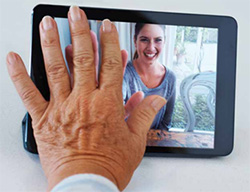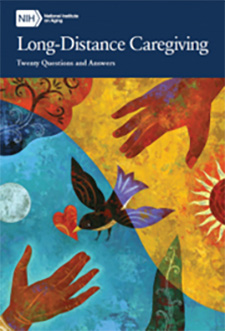
Caregiving Tips for Long-Distance CaregiversWATCH SEGMENT ON KFOR-TV 
Providing care and support for an aging parent who lives far away can present a variety challenges that can make the job difficult and stressful. It is estimated there are around 7 million people in the U.S. today who are considered to be long-distance caregivers. These are people who live at least one hour away and are an integral participant in the care of another. If you are caring for an aging parent or other loved one from afar, here are some tips and resources that can help.
Professional Help If your parent needs a lot of help, you should consider hiring an "geriatric care manager" who will give them a thorough assessment to identify their needs and will set up and manage all aspects of care. These professionals typically charge between $100 and $250 per hour after an initial assessment, which can run $150 to $750, and are not covered by Medicare. To find a geriatric care manager in your parent's area, visit AgingLifeCare.org or contact the nearest Area Agency on Aging to see if they have a list of providers.
Do-It-Yourself Assemble a support system: Put together a network of people (nearby friends or family, neighbors, clergy, etc.) who can check on your parent regularly, and who you can call on from time to time for occasional help. Also put together a list of reliable services you can call for household needs like lawn care, handyman services, plumber, etc. Tap local resources: Most communities offer a range of free or subsidized services that can help seniors with basic needs such as home delivered meals, transportation, senior companion services and more. Contact the Area Aging Agency near your parent - call 800-211-2116 for contact information - to find out what's available. Use financial aids: If your parent needs help with his financial chores, arrange for direct deposit for their income sources, and set up automatic payments for their utilities and other routine bills. You may also want to set up your parent's online banking service, so you can pay bills and monitor their account anytime. Or, if you need help, hire a daily money manager (AADMM.com) to do it for you. They charge between $25 and $100 per hour. 
Hire in-home help: Depending on your parent's needs, you may need to hire a part-time home-care aide that can help with things like preparing meals, housekeeping or personal care. Costs can run anywhere from $12 up to $25 per hour. To find someone, ask for referrals through your parent's doctor or try websites like Care.com or CareLinx.com. Utilize technology: To help you keep tabs on your parent from afar, there are various technologies that can help. For example, there are medical alert systems, video camera monitors, wearable activity trackers, and electronic pill boxes that can notify you if he or she has taken their medications. And to help you coordinate care with members of their care team there are websites like LotsAHelpingHands.com. For more tips, call the National Institute on Aging at 800-222-2225 and order their free booklet "Long-Distance Caregiving: Twenty Questions and Answers." |




